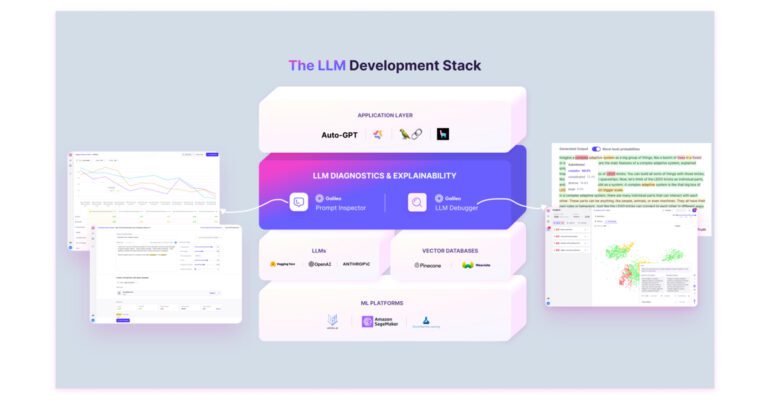TL;DR:
- Galileo introduces Galileo LLM Studio, a platform revolutionizing the deployment of large language models in enterprises.
- The platform detects and rectifies “model hallucinations” and improves model accuracy, enabling faster adoption of AI.
- Demand for natural language processing is surging, and Galileo LLM Studio aims to streamline the process of dataset cleaning.
- The platform allows data scientists to compare prompts, find optimal inputs, and estimate the costs of external AI services.
- Galileo plans to expand into other AI domains, such as computer vision.
- Galileo faces competition from tech giants like Google, Microsoft, and AWS but differentiates itself through its focus on diagnosing and fixing model errors.
Main AI News:
San Francisco-based artificial intelligence startup, Galileo, is making waves with the introduction of Galileo LLM Studio. This cutting-edge platform is set to transform the deployment of large language models, empowering companies to embrace natural language processing (NLP) models seamlessly. By detecting and rectifying “model hallucinations” – incorrect predictions – and enhancing model accuracy, Galileo LLM Studio is poised to accelerate the adoption of AI in various industries.
In an exclusive interview with VentureBeat, Yash Sheth, the co-founder of Galileo, shed light on the vision behind LLM Studio. He shared, “We firmly believe that generative AI has the potential to revolutionize the world. The possibilities for enterprises, governments, and individuals to interact with AI have expanded beyond predictive machine learning’s limitations.”
The demand for natural language processing has surged in recent times, as businesses seek to leverage models for chatbots, intelligent search functionalities, and automated text generation. Nevertheless, building and implementing these complex models present significant challenges. Sheth explained that data scientists spend a substantial amount of time on “data cleaning” to enhance model accuracy.
Sheth further revealed, “Despite having the finest talent, the best teams, and top-notch infrastructure, it took us months to successfully launch a single model into production. As we explored the broader AI industry, we realized that this was the prevailing situation.”
Galileo aims to streamline the laborious process of dataset cleaning through its innovative platform. Galileo Prompt Studio, a component of LLM Studio, detects “model hallucinations” swiftly, allowing data scientists to address errors promptly. Additionally, the platform enables data scientists to compare various prompts, facilitating the discovery of the most optimal input. Moreover, Galileo estimates the costs associated with utilizing external AI services such as OpenAI, offering effective budget management solutions.
As generative models become increasingly commoditized, Sheth asserts that comprehending the impact of data and its adaptability within these models is vital. He expressed, “Adapting these models and ensuring their efficiency requires a considerable amount of time. Any measures we can take to expedite this process will undoubtedly accelerate the global adoption of AI.”
Galileo’s ambitions extend beyond natural language processing, as they aspire to venture into other AI domains, including computer vision. Sheth explained, “Our algorithms transcend data formats, as they are embedded within neural networks. Ultimately, the neural networks represent data as a vector of floats.“
Galileo’s recent funding success of $18 million, supported by prominent investors like Battery Ventures, positions the company to capitalize on the surging demand for practical AI tools. However, Galileo faces fierce competition from tech giants such as Google, Microsoft, and AWS, who also offer platforms for building and managing AI models. Nevertheless, Galileo’s distinct focus on diagnosing and rectifying model errors sets them apart.
Sheth emphasized, “A data-centric approach, accompanied by a comprehensive model diagnostic view throughout the machine learning lifecycle, is undeniably critical for AI adoption.”
Conclusion:
Galileo’s launch of LLM Studio signifies a significant step forward in AI integration for enterprises. The platform’s capabilities in detecting and rectifying model errors, streamlining dataset cleaning, and facilitating prompt comparison provides businesses with a powerful tool for adopting AI more efficiently. With plans to expand into other AI domains, Galileo is poised to make a lasting impact in the market. However, it faces strong competition from established tech giants. The data-centric approach and comprehensive model diagnostic view offered by Galileo LLM Studio are crucial for driving AI adoption across industries.

